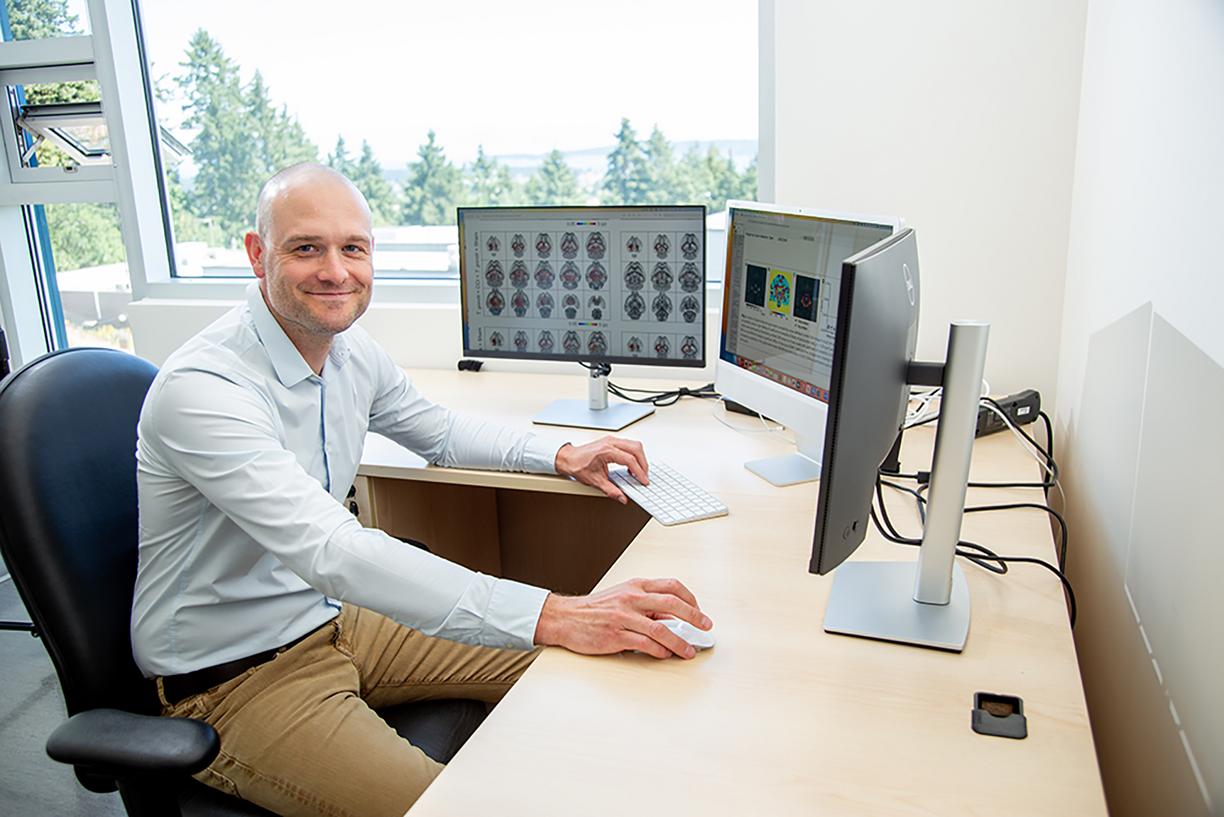Dr. Sandy Shultz aims to improve health outcomes for domestic violence survivors
Are you a domestic violence survivor? VIU researcher and neuroscientist Dr. Sandy Shultz is part of a project that aims to improve the diagnosis of brain injury in survivors of intimate partner violence. He’s looking for people to be part of this research. Results will be used to improve health outcomes for domestic violence survivors.
Research shows that many domestic violence survivors, many of whom are women, also have brain injuries. The long-term health impacts if this condition remains undiagnosed are significant.
“We know from studies in former athletes and soldiers that previous brain injuries are a risk factor for the later development of Alzheimer’s disease and related dementias. We also know that many intimate partner violence victim-survivors experience brain injuries due to the physical attacks,” said Shultz. “But how these injuries relate to the long-term brain health in intimate partner violence survivors has not been rigorously studied.”

This important project involves many collaborators, including:
- Island Health and Nanaimo Brain Injury Society on Vancouver Island, and
- the University of BC, Fraser Health and Supporting Survivors of Abuse and Brain Injury through Research (SOAR) farther afield.
“Dr. Shultz’s groundbreaking research is crucial for raising awareness of the silent epidemic of brain injury related to intimate partner violence and improving the care and quality of life for survivors,” said Kix Citton, Executive Director of the Nanaimo Brain Injury Society. “His commitment to engaging with the community and people with lived experience is admirable. Dr. Shultz has made significant efforts to connect with brain injury survivors through the Nanaimo Brain Injury Society, visiting our office and including folks not only as study participants but in research development. We are grateful to have this critical research happening in our community, and we are committed to supporting his innovative work.”
Anyone who wants to take part in this study should be at least six months removed from a violent relationship. If you’re interested, you can connect with Shultz’s research team directly by emailing kelly.mckinney2@viu.ca.
How did you come to study this issue?
I’ve studied brain injury for the past 15 years, but during COVID-19 lockdowns we noticed a steep increase in the number of brain injury cases due to intimate partner violence that were presenting to emergency departments. I soon became aware of how prevalent this issue is and shifted my research attention to this under-recognized problem.
How common is brain injury in survivors of intimate partner violence?
There is evidence that approximately one-third of Canadian women experience intimate partner violence and that 60 to 90 per cent may experience a brain injury. Even using conservative estimates, this represents a major societal and medical problem that requires urgent attention.
How can dealing with a brain injury impact someone, especially when they’re trying to rebuild their lives after leaving a violent relationship?
A brain injury can affect a person in many ways, including cognitive and sensory problems, headaches, sleep disturbances and changes in personality. In some cases, they might not realize that they have even experienced a brain injury and that the problems they are having can be attributed to it. This condition can negatively impact someone’s ability to navigate the already challenging and complex scenario of leaving a violent relationship.
What is your long-term aim with this research?
Our team’s goal is to:
- improve our ability to detect when a brain injury has occurred,
- improve the support services and interventions available to victim-survivors, and
- develop educational materials and prevention strategies.
How do you determine if a brain injury has occurred?
The most common method relies on the patient, or another witness, explaining the situation and the signs and symptoms they are experiencing. This is problematic in the intimate partner violence setting because witnesses are often not forthcoming and the patient may be unable (they can’t remember because they’ve had a brain injury) or unwilling (such as out of fear) to report the event. To overcome this, our team and others are working towards developing a blood test that can determine if someone has had a brain injury.
What can people expect if they take part?
It will take about two hours of their time and they will attend an in-person one-on-one research session at the VIU Centre for Trauma and Mental Health Research (in building 495 on the Nanaimo campus). They will answer questions about their past medical and relationship history, complete some cognitive tests and provide a blood sample. Participants will not have to pay for parking and they will receive a credit card voucher.
Support this important research
Interested in donating to support this important research? Contact Elspeth Erickson, VIU Foundation Advancement Officer, at Elspeth.Erickson@viu.ca or go to the VIU donations page and designate your gift to the “Centre for Trauma and Mental Health Research Fund.”





